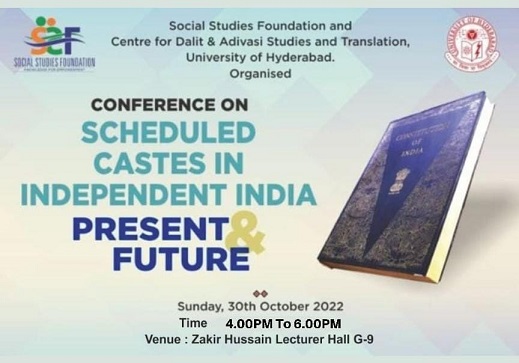
Social Studies Foundation, working with the prime objective of conducting studies and research in multi-disciplinary aspects of society. SSF. Focuses on various problems and issues of the socially discriminated and deprived classes of Indian society. Social Studies Foundation believes that there is a need to look deeply into the issues, identify the root cause, and come out with solutions that are positive in nature and promotes a feeling of oneness and social harmony.
To keep this in mind, SSF came out with a thought to organize a one-day seminar on the theme, ‘Scheduled Castes in independent India: Present & Future,’ where Professors, Associate Professors, Assistant Professors, and Research Scholars will come together and discuss the strengths of Scheduled Castes, about social, economic, political, educational, psychological problems faced by the community, how to overcome these problems, to discuss the solutions and along with this for Scheduled Castes what are the activities are going on in the different universities. To discuss more on this, Social Studies Foundation, in collaboration with the Centre for Dalit & Adivasi Studies and Translation, University of Hyderabad, organized a one-day seminar on ‘Scheduled Castes in independent India: Present & Future’ in the Zakir Husain Auditorium, the University of Hyderabad. Where 47 representatives from different universities of Karnataka, Telangana, Andhra Pradesh, Tamilnadu and Kerala states have participated. They having expertise in public administration, computer science, sociology, social sciences, Dr. Ambedkar studies, Anthropology came together to discuss on above subjects in this one-day seminar.
The seminar was inaugurated with a floral tribute to Bharat Mata and Bharat Ratna Dr. Ambedkar at the auspicious hand of Prof. Sarraju, Pro V.C.- U.O.H., Prof. Vishnu Sarwade, Head of Centre for Dalit & Adivasi Studies and Translation- U.O.H., Prof. Ramraju, Senior Professor and Head of Department of Psychology, Academic Senate Member in Andhra University, Prof. Alok Kumar Gaurav, Assistant Professor of Public Administration in Central University.
The a daylong seminar conducted into four sessions. The first session topic was ‘Strengths of Scheduled Castes in the present Day.’ Prof. Ramraju has elaborately explained through his presentation that in the Judiciary, Sports, Arts, Cinema, and Administration, the members of Scheduled Castes communities have reached the topmost positions. Dr. Ambedkar was the biggest strength of all the deprived classes. The participants discussed that, the constitution of India is our strength, which gives rights to education, giving rights to live with dignity to every citizen of India. Scholars expressed that everything cannot be stolen or taken away, but if you have the knowledge, that cannot be stolen. Prof. Alok Kumar Gaurav concluded the session with a statement that more knowledge would increase the empowerment; however, those with less knowledge will vanish.
In the second session, participants discussed the ‘Present day’s and future economic, social, political, and educational problems and challenges before the Scheduled Castes’; Dr. Nagamani initiated this discussion, Senior Assistant Professor in the School of Computer and information sciences U.O.H. Where she explained that there are few occasions when people of other castes are not allowing S.C. students for research work, Dr. Divya from Kerala University added that there are psychological problems also with the S.C. students; so that they are developed with some complex, and this inferior complex harms their growth. Participants raised concerns that SC Ph.D. Scholars need to get Rajiv Gandhi Fellowship. The criteria are different for every student. However, one retired professor clarified that if universities cannot accommodate Ph.D. scholars for their research, then it is difficult to get the Rajiv Gandhi fellowship. This session was concluded by Dr. Gangadhar, Professor, and Chairman of the Department of Studies of Anthropology at the University of Mysore.
In the third session, participants discussed ‘Local and Regional problems of S.C. : Solution thereof and our role in the same,’ Dr. Sanjivrayyappa, Lecturer in M.E.S.P.U. College, Bangalore, raised questions about the misuse of the false S.C. certificates and the delay in hearing the cases of forgery use of fraudulent certificates. The solution for this is that the courts should come forward to deliver their judgments in this kind of cases, and if found guilty, the accused should be punished as per the law. Scholars from U.O.H. suggested that instead of naming the hostels as S.C. hostels or B.C. hostels, we can rename them as Hostels with the name of some personalities’, this will lead us to social harmony. This session was concluded by Dr. Aditi Narayani, Assistant Professor at the University of Delhi.
In the last session, Hon. Prof. B.J.Rao sir said in his speech that India is the fifth largest economy; however, up to 82% of the contribution to the GDP comes from the non-formal sector. We need to create more jobs in the field of Farming. In developed countries, the GDP contribution is high from the farming sector. We must bring Scheduled Castes into skilled employment; we need to provide them with job security from that they can contribute more to society. But the irony is that, as a nation, we failed to do so. While providing education to Scheduled Castes students, we must prepare them with skills also. This change can be done at the university level. He said you cannot be the first largest economy in the world and still have disparities, which can be considered a failure. We must decrease or end our internal struggle and enlighten people from Scheduled Castes, holding their hands. It is the responsibility of the elders to motivate the younger ones. The community needs to come forward. We must work together for the country, and there should be cohesion in the community. The deprived section should come out of the shell.
The seminar was concluded with a remark that a solution for each and every problem lies within us, if we all are aware and unite with oneness of our society.














